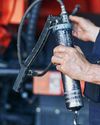يحاول ذهب - حر
The Secrets For Implementing A Clean lubricant Program
March - April 2024
|MACHINERY LUBRICATION INDIA
If you could find an investment that guaranteed a return 40 times greater than your initial investment, you probably wouldn't pass it up.
-

According to the Institute of Mechanical Engineers, that's exactly the return organizations can expect when they invest in quality lubricants and best-in-class lubrication practices.
For every $1,000 those organizations invest in the right lubricant and the right handling, they can expect cost reductions of $40,000 in the form of increased reliability.
A proper lubrication program begins with meeting all three of the lubricant specifications for your organization's equipment:
1. Viscosity
2. Performance
3. Cleanliness
Achieving the first two depends primarily on selecting the right lubricant. It's important to choose the lubricant that has the correct viscosity and the right blend of base oil and additives to provide the performance you need.
You Control Lubricant Cleanliness
The third specification - lubricant cleanliness – is almost entirely up to you. While choosing a lubricant with the right cleanliness specifications is an important start, actual cleanliness depends largely on how your organization stores and handles the lubricant.
Interestingly, cleanliness is a factor many organizations overlook in the lubricants they buy and use. Many sites have failed to establish new lube cleanliness specs and overlook cleanliness when managing lubricants. But without addressing cleanliness, you cannot achieve an optimal lubrication and reliability program.

Contamination is a Significant Problem
Lubricant contamination is widely recognized as the leading cause of lubricant related equipment failure. According to Noria, 82% of mechanical wear is caused by particle contamination in lubricants. In addition, dirt and contaminants are the leading cause of hydraulic system failures.
هذه القصة من طبعة March - April 2024 من MACHINERY LUBRICATION INDIA.
اشترك في Magzter GOLD للوصول إلى آلاف القصص المتميزة المنسقة، وأكثر من 9000 مجلة وصحيفة.
هل أنت مشترك بالفعل؟ تسجيل الدخول
المزيد من القصص من MACHINERY LUBRICATION INDIA

MACHINERY LUBRICATION INDIA
PREDICT OIL USEFUL LIFE WITH REAL-TIME DATA
Oil is the life of any hydraulic or lubrication system.
8 mins
November – December, 2025

MACHINERY LUBRICATION INDIA
HOW THE RIGHT LUBRICATION TOOLS AND HARDWARE INFLUENCE MACHINE RELIABILITY
Having spent a good portion of my career around heavy machinery, both in the military and later in the civilian world, I’ve come to realize one critical fact: the tools you use matter just as much as the skills you have.
4 mins
November – December, 2025

MACHINERY LUBRICATION INDIA
Unlocking the Power of Oil Analysis & Particle Counting
Lubrication practices ensure peak performance and longev ity in machinery maintenance.
4 mins
November – December, 2025

MACHINERY LUBRICATION INDIA
BEYOND THE LABEL: UNDERSTANDING LUBRICANT TECHNICAL AND SAFETY DATA SHEETS
Over the years in lubrication, I have noticed that many professionals either overlook or misinterpret lubricant datasheets, especially Product Datasheets (PDS), which are key to selecting the proper lubricant. While Safety Datasheets (SDS) are widely known due to compliance requirements, the PDS holds the technical insights needed for informed decision-making. Yet, it is often misunderstood or ignored.
3 mins
November – December, 2025

MACHINERY LUBRICATION INDIA
SMART FILTRATION IN HEAVY INDUSTRIES:
PROTECTING WORKERS IN CEMENT AND STEEL MANUFACTURING
5 mins
November – December, 2025

MACHINERY LUBRICATION INDIA
IOCL & INFINEUM FORGE STRATEGIC LUBRICANT PARTNERSHIP
Infineum India and Indian Oil Corporation Limited (IOCL) have signed a strategic Memorandum of Understanding (MoU) aimed at deepening their collaboration to unlock long-term business value and drive innovation in India's mobility sector. The agreement was formalized at IOCL's Mumbai office, with Bakim Patra, Executive Director (Lubes) at IOCL, and Harshad Jambaulikar, General Manager of Infineum India, as the principal signatories.
1 min
November – December, 2025

MACHINERY LUBRICATION INDIA
CONTAMINATION REALIZATION: A CASE EXAMPLE AT A STEEL MILL
Condition monitoring, contamination control, lubrication excellence, and machine reliability are keywords that are often overused and misunderstood.
6 mins
November – December, 2025

MACHINERY LUBRICATION INDIA
BREAKING DOWN THE BASICS: A LESSON IN ASSET RELIABILITY
Before you go marching down to your reliability engineers and ask questions like, “What are the top 10 worst performing assets in our production line?”, it’s important to know the actual difference between an asset and reliability.
7 mins
November – December, 2025

MACHINERY LUBRICATION INDIA
EFFECTIVE USE OF THE PATCH TEST FOR SIMPLE ON-SITE ANALYSIS
The very best oil analysis programs incorporate some degree of onsite analysis. For most plants, mills, and mines, particle monitoring is the most productive onsite oil analysis activity available.
4 mins
November – December, 2025
MACHINERY LUBRICATION INDIA
CAFFEINE VS. CALM: FINDING THE RIGHT ENERGY BALANCE DURING WORK HOURS
For many of us, the workday doesn't officially begin until the first sip of coffee. In industrial and corporate settings alike, caffeine is often seen as a silent coworker, fueling early mornings, long shifts, and back-to-back meetings.
2 mins
November – December, 2025
Listen
Translate
Change font size
